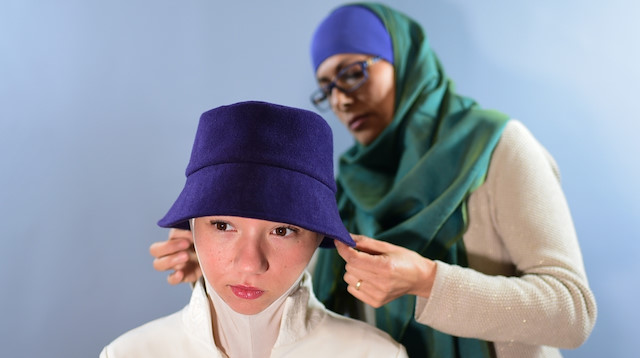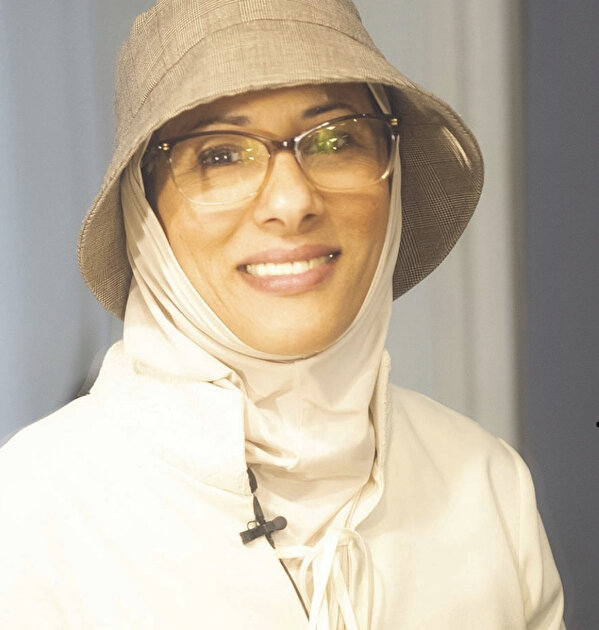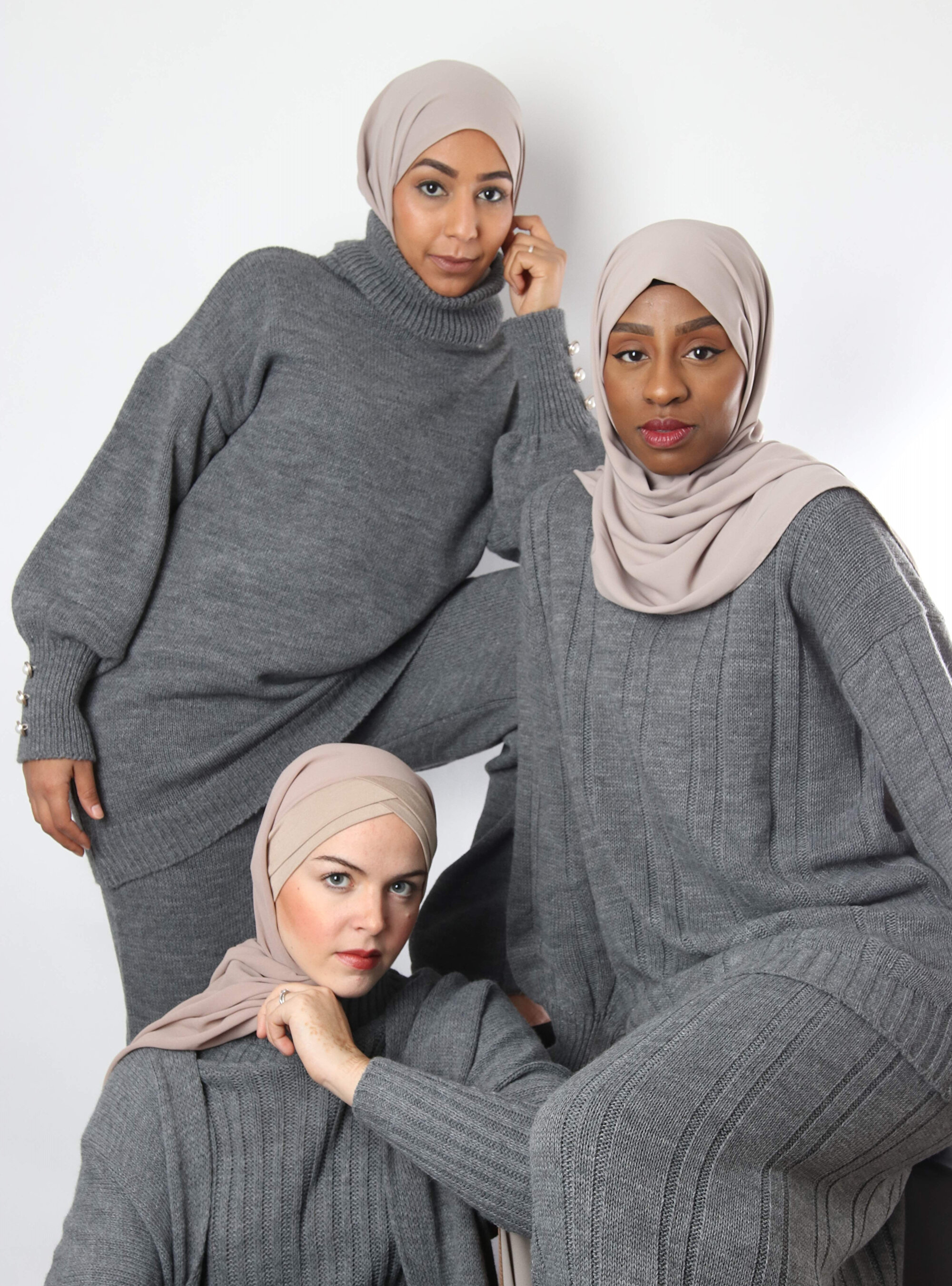
As World Hijab Day is commemorated, France faces backlash, growing clientele for modest clothing items
Few issues trigger reactions in French politics as much as Muslim women donning the veil and headscarf, or hijab, who once again find themselves at the center of controversy as far-right leader Marine Le Pen last week proposed a nationwide ban of the garment on the streets and in public places.
A day before world hijab day is marked on Feb. 1, activists from feminist group Nemesis, dressed in flowing black burqas, staged a protest in front of the Trocadero, overlooking the Eiffel tower. They held a large banner that read, "France in 50 years" in a visual assertion that this is the future of the country if "creeping Islamists” are not reigned in.
"World hijab day is an ideological weapon aimed at trivializing the veil, it is a real insult to the women who are forced to wear it. As identity feminists, we wanted to show the French the face of France in 50 years if the Islamists and their accomplices win," the group said in a statement, adding that Paris police arrested the group's president for this peaceful action. "It's not a fantasy, for our girls, let's fight before it's too late," they said.

France has some of the most restrictive laws in Europe against public displays of religion and religious symbols. Girls in school are already prohibited from wearing the hijab, while full face-covering burqas were outlawed in public in 2010. Several municipalities adopted a burkini ban barring women with full-body-concealing swimwear from beaches, though this was later challenged in court and suspended but continues to be in force erratically.
Nevertheless, clothing associated with Islam and Muslims is often attacked on the grounds of being a "symbol of Islamic extremism and separatism."
Yet, a growing number of French fashion brands run by veiled women have cropped up in recent years, selling modest fashion options from hijabs and turbans to full-body coverings like the jilbabs and burkinis. The recently concluded 36th edition of the "oriental fashion" week alongside the Paris fashion week in January showcased caftans, robes and wide-legged palazzo pants, aptly depicting the growing clientele for such fashion.
The popularity of these enterprises shows, that beyond politics and discrimination, there is an ever-growing demand and large market to tap into in France, which is home to the largest Muslim minority in Europe.
"Imposed bans will not change the behavior of Muslims, quite the contrary. The more we forbid such fashion the more enthusiasm it arouses," says Bassma Wehbe, founder of the Nice-based Zaynab stylist and online brand specializing in comfortable designer Islamic clothing. Her range of tailor-made, high-end clothing is designed for veiled Muslim women "to feel free and true to our religion," she said.
"Many Muslim women struggle to compose practical and elegant sports and beach wardrobes doing 'the best' with what they have on hand. So yes, there is a very large market to be taken and the community has great purchasing power too," Wehbe affirmed, noting that her brand's hijabs saw high annual sales, with demand for burkinis soaring during the summer season.
Myriam Garrigues, a 32-year-old self-taught stylist and owner of Mimoza, a brand based in Toulouse designing Islamic outfits for women, men and children, feels that interest is growing in modest fashion thanks to the open-mindedness the younger generation that has no desire to assert their identity and refuse to give up on their choices as older generations did.
In her own experience as a young veiled woman, Myriam says she never faced discrimination professionally though her garb elicited negative reactions in some cases, almost preventing her from taking the end-of-highschool baccalaureate exams or from entering college. "But, as long as the law allowed me to wear it, I was able to assert my rights. To do this, it's essential to know our rights and not be afraid to demand that they be respected," she said.
Wearing the veil still comes at a great cost for many other professional women often forced to choose between their religious identity or career.
A senior duty officer employed with a private airline, who prefers to be named as Rachida in this story, recalls how her French boss was alarmed when she decided to start wearing the hijab seven years ago and refused to help her source a uniform with the head covering, which was easily available in neighboring Britain. "He would say, 'But why? You look so beautiful, so why the hijab?'”
Rachida then started noticing changes among the immigration staff at Paris Charles de Gaulle Airport. The customs officer who knew her familiar face would now regularly single her out, while in Paris's historic city center and at Champs Elysee, she was stopped by police who would ask to see her papers. "I failed to understand why they would behave in this manner, when I've been at the airport for work every second week. And all this started to happen only after I began to cover my head."

While Rachida was lucky enough to work at a company that supported and allowed her to wear the hijab as part of her uniform, Yousra, another hijab wearing Muslim woman who preferred to withhold real name in this article, faced discrimination that led twice to her dismissal due to her headscarf.
Once while employed at a women's boutique in Paris, her manager refused to extend her contract, while at a later job at a real estate firm, a client specifically complained about her headscarf. At both places, she was told explicitly that she would not be able to work with her hijab.
A 2018 study by sociologist Hanane Karimi reinforces the wide sentiments that Muslim women in France are deterred from accessing the job market due to Islamophobia and discrimination, pushing them instead into social entrepreneurship and self-employment.
Karimi's study found that the desire to "start a business of one's own was at once an expression of a refusal to negotiate the right to wear a hijab, which is constitutive of one's identity as a Muslim woman, and an act of overcoming the negative stereotypes to which they are subjected."
Yousra's story is such that confirms Karimi's findings. A graduate of a business school, she turned the headscarf into an advantage by starting her own real estate agency. "There are very few veiled women who work in real estate and clients who are Muslims or from other religions approach me because they know I have principles," she confirms, smilingly.
Rachida and Yousra admit that while things have worked out in their favor so far, for many other hijab-wearing French women, the challenges to aspire for a career and the inner struggle to stay true to their faith are made more difficult in the current political environment. Both feel that if the situation in France worsens amid the rise of right-wing politics, they could have to immigrate to other countries.
Bassma, too, believes that the government does not have the right to forbid women from wearing the hijab in public places as "this would impact our freedom and human rights."
"When the government cannot solve the real problems at hand like healthcare and rising unemployment, they try to create problems and tell people they have a solution to resolve it," Rachida summarized her feelings towards legislation proposed by the Macron government against so-called "Islamist separatist" and the counter-bill proposed by Le Pen, attacking the wider Muslim population. "I will not remove my hijab for Le Pen," she says with confidence.
Myriam too has noticed a shift following debates on the government's proposal that raises questions on young children wearing hijabs. She revealed that a few weeks after this question was raised at the National Assembly in January, her brand was "entitled to an inspection by authorities including police, tax regime, social security and labor inspector." "I guess it's no accident," she reluctantly admits.
Hello, the comments you share on our site are a valuable resource for other users. Please respect other users and different opinions. Do not use rude, offensive, derogatory, or discriminatory language.
The floor is all yours.








